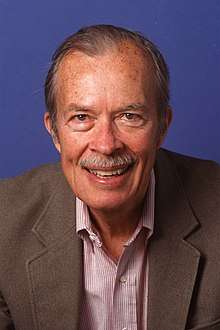John Terborgh
John Whittle Terborgh (born April 16, 1936) is a James B. Duke Professor of Environmental Science at Duke University and Co-Director of the Center for Tropical Conservation. He is a member of the National Academy of Science,[1] and for the past thirty-five years, has been actively involved in tropical ecology and conservation issues. An authority on avian and mammalian ecology in Neotropical forests, Terborgh has published numerous articles and books on conservation themes. Since 1973, he has operated the Cocha Cashu Biological Station, a tropical ecology research station in Manú National Park, Peru.[2]
John W. Terborgh | |
|---|---|
 | |
| Born | 1936 (age 83–84) |
| Nationality | American |
| Education |
|
| Awards |
|
| Scientific career | |
| Fields | Conservation biology |
| Institutions | |
| Signature | |
 | |
Raised in Arlington, Virginia, Terborgh graduated from Harvard College in 1958 and received his PhD in plant physiology from Harvard University in 1963. He served on the faculty of the University of Maryland and then, for 18 years, on the faculty of Princeton University. In 1989, Terborgh moved to Duke University, where he joined the faculty of the (now) Nicholas School of the Environment and founded the Duke University Center for Tropical Conservation.[3]
In June 1992, Terborgh was awarded a MacArthur Fellowship in recognition of his distinguished work in tropical ecology, and in April 1996 he was awarded the Daniel Giraud Elliot Medal from The National Academy of Sciences for his research, and for his book Diversity and the Tropical Rainforest. In 2005, he was elected Honorary Fellow of the Association for Tropical Biology and Conservation during the organization's annual meeting held in Uberlândia, Brazil.[4][5][6]
He has served on several boards and advisory committees related to conservation, including the Wildlands Project, Cultural Survival, The Nature Conservancy, The World Wildlife Fund and both the Primate and Ecology Specialist Groups of the International Union for the Conservation of Nature.[7]
Terborgh and his work are featured prominently in the documentary film, The Serengeti Rules, which was released in 2018.[8]
Publications
Terborgh is the author of hundreds of scientific papers and popular essays, and author or editor of several books:
- Requiem for Nature. Island Press. 2004. p. 256. ISBN 1-55963-588-6.
- Making parks work: strategies for preserving tropical nature. Island Press. 2002. p. 511. ISBN 1-55963-905-9.
- Diversity and the Tropical Rain Forest. Scientific American Library. 1992. p. 242. ISBN 0-7167-5030-9.
- Where Have All the Birds Gone? Essays on the Biology and Conservation of Birds That Migrate to the American Tropics. Princeton University Press. 1989. p. 224. ISBN 0-691-02428-6.
- Five New World Primates: A Study in Comparative Ecology. Princeton University Press. 1983. p. 260. ISBN 0-691-08338-X.
References
- http://www.nasonline.org, National Academy of Sciences -. "John Terborgh". www.nasonline.org. Retrieved 2017-07-04.
- Bateman, Daniel (2015-10-24). "Indiana Jones' of ecology right at home at JCU in Cairns". The Cairns Post. Retrieved 2017-07-04.
- "John W. Terborgh | Nicholas School of the Environment". nicholas.duke.edu. Retrieved 2017-07-04.
- "John W. Terborgh — MacArthur Foundation". www.macfound.org. Retrieved 2017-07-04.
- National Academy of Sciences. "Daniel Giraud Elliot Medal". www.nasonline.org. Archived from the original on 2015-09-05. Retrieved 2017-07-04.
- "ATBC Honorary Fellows". 2013-07-31. Retrieved 2017-07-04.
- "Wildlands Network". Archived from the original on 2015-09-10.
- "'The Serengeti Rules': Film Review". The Hollywood Reporter. Retrieved 2019-06-06.